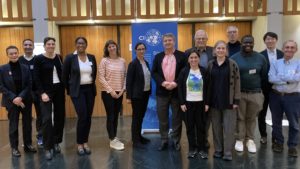Click here for the member area of WGXV Pharmacoepidemiology for Public Health
Working Group XV – Pharmacoepidemiology for Public Health

Background
Pharmacoepidemiology aims to appraise and understand the use and effects — both beneficial and adverse — of medicines in real-world settings. As such it can be considered a bridge science, linking clinical pharmacology, epidemiology, public health and the social sciences.
Medicines are public health tools. With regard to the quality and transparency of the assessment of their effectiveness and safety, they are increasingly subject to the expectations and requirements of patients, healthcare professionals and regulators. Those involved in the development and delivery of medicines must therefore take full account of the aforementioned paradigm shifts. Additionally, the arrival of novel therapeutic agents, such as gene therapy, biologics and mRNA vaccines, whose modes of action and interactions with living organisms have very little in common with those of the more traditional chemical medicines, has brought into question the classic elements of pharmacovigilance and pharmacoepidemiology, such as the dose‒effect relationship, drug causation criteria and the determination of drug exposure.
CIOMS full concept note on Pharmacoepidemiology for Public Health
Working Group objectives
The objectives of this Working Group are to develop an inventory of situations, both real and theoretical, representing the challenges that the assessment of the impact of medicines on public health now entails. For each situation, the working group will define:
- whether a pharmacoepidemiological study could be appropriate or should be conducted
- what information it should generate
- what would be the timeframe for setting up this study and obtaining relevant results
- what would be the study limitations and possible untoward consequences
- whether a simpler and/or faster approach, always guided by common sense, should be adopted e.g. drug utilization data, meta-analysis of available data, modelling, could provide sufficient information on this issue.
- these assessments will be synthesized so that a set of recommendations for each situation can be drafted.
Additionally, to consider to what extent the paradigms of One-Health and global public health, and the launch of novel health products such as biologics, bring into question the applicability of some of the key concepts and approaches of the current application of pharmacovigilance and pharmacoepidemiology.
Progress
- 1st meeting held on 2-3 November 2023 (Geneva) Minutes
- 2nd meeting held on 26 February 2024 (virtual) Minutes
- 3rd meeting held on 23-24 May 2024 (Paris) Minutes
- 4th meeting held on 21 October 2024 (virtual) Minutes
- 5th meeting held 4-5 December 2024 (Geneva) Minutes
- 6th meeting held 30-31 October 2025 (Geneva) Minutes
CIOMS Working Groups usually take 3 years to finalize their consensus document and recommendations. Most groups hold one or two in-person meetings per year, with virtual meetings in between. The groups make use of collaborative efforts and capitalize on existing initiatives in order to provide output that is as comprehensive as possible, does not duplicate other efforts and has added value.
CIOMS MEETINGS
Upcoming Meetings
26 - 27 January 2026
Barcelona, Spain
